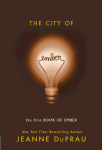Can You Hear Me Now in City of Ember?
 When I first remarked on the content of City of Ember, by Jeanne DuPrau, the better-read Elizabeth Bird of Fuse #8 commented on the similarities of its setup with three other books:
When I first remarked on the content of City of Ember, by Jeanne DuPrau, the better-read Elizabeth Bird of Fuse #8 commented on the similarities of its setup with three other books:
• The Wind Singer, by William Nicholson
• The Giver, by Lois Lowry
• Below the Root, by Zilpha Keatley Snyder
In all four books, she remarked:Child turns 12 and will now have the job they will carry for the rest of their life. Child then discovers the ugly underbelly of his/her otherwise perfect society. . . . If the child is a boy, as in The Giver and Below the Root, then the job he's been given is extra special. If the child is a girl, as in The Wind Singer and City of Ember, the job requires running around a lot.
To which I could only reply:It struck me how Lina's job as messenger ("running around a lot" indeed) might reflect some modern stereotypes about girls. She gets to be active, yet her activity (as opposed to the boy Doon's) involves communication and personal relationships rather than machinery.
Carol Gilligan would be proud, in other words. Of course, it helps a plot for any young hero to be privy to news and secrets, and thus to be at a communication nexus (such as Fuse #8). I think that's why Johnny Tremain went to work for a printer back in the 1940s--or 1770s, if you prefer.
What about stereotypes of boys? Doon is ambitious, hot-tempered, fascinated by bugs, and technically oriented. And as for males getting the extra special jobs, these books need some grounding in reality, right?
Looking back (down?) on City of Ember from its conclusion, I can't help thinking about how carefully DuPrau chose technology to open up the messenger job for Lina. Her dystopic society is set in the future. The city is lit by incandescent lightbulbs (patented 1880) and heated with electric burners (1889). But it has no telephone (invented 1876) or telegraph (1830), so for communication from one block to another the city relies on adolescents running back and forth and reciting messages.


1 comment:
Elizabeth Bird's comment is possibly the most discouraging thing I have heard since I got to Harvard/Radcliffe as a girl and found that the girls had to have attendance taken and the boys didn't. Have we learned nothing in fifty years? (But I guess that may be her point.)
Post a Comment